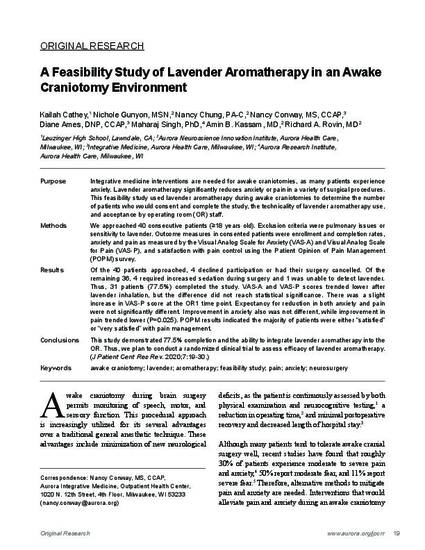
- awake craniotomy,
- lavender,
- aromatherapy,
- feasibility,
- pain,
- anxiety,
- neurosurgery,
- brain tumor,
- integrative medicine
Purpose: Integrative medicine interventions are needed for awake craniotomies, as many patients experience anxiety. Lavender aromatherapy significantly reduces anxiety or pain in a variety of surgical procedures. This feasibility study used lavender aromatherapy during awake craniotomies to determine the number of patients who would consent and complete the study, the technicality of lavender aromatherapy use, and acceptance by operating room (OR) staff.
Methods: We approached 40 consecutive patients (≥18 years old). Exclusion criteria were pulmonary issues or sensitivity to lavender. Outcome measures in consented patients were enrollment and completion rates, anxiety and pain as measured by the Visual Analog Scale for Anxiety (VAS-A) and Visual Analog Scale for Pain (VAS-P), and satisfaction with pain control using the Patient Opinion of Pain Management (POPM) survey.
Results: Of the 40 patients approached, 4 declined participation or had their surgery cancelled. Of the remaining 36, 4 required increased sedation during surgery and 1 was unable to detect lavender. Thus, 31 patients (77.5%) completed the study. VAS-A and VAS-P scores trended lower after lavender inhalation, but the difference did not reach statistical significance. There was a slight increase in VAS-P score at the OR1 time point. Expectancy for reduction in both anxiety and pain were not significantly different. Improvement in anxiety also was not different, while improvement in pain trended lower (P = 0.025). POPM results indicated the majority of patients were either “satisfied” or “very satisfied” with pain management.
Conclusions: This study demonstrated 77.5% completion and the ability to integrate lavender aromatherapy into the OR. Thus, we plan to conduct a randomized clinical trial to assess efficacy of lavender aromatherapy.
Cathey K, Gunyon N, Chung N, Conway N, Ames D, Singh M, Kassam AB, Rovin RA. A feasibility study of lavender aromatherapy in an awake craniotomy environment. J Patient Cent Res Rev. 2020;7:19-30. doi: 10.17294/2330-0698.1716
